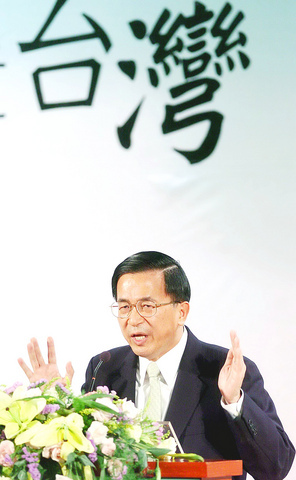Collective anxiety about changes to the electoral system which threaten to relegate half the current legislators to the unemployment line and infighting over nominations for the 2008 presidential election account for the upheaval in the Democratic Progressive Party (DPP) over the past week, political analysts said.
The unexpected cancellation of the DPP's debate on China policy (thanks in part to the lack of communication between the party and the Executive Yuan), the withdrawal of a dissatisfied lawmaker from the party, the decision of a group of young lawmakers to launch a conference on party reform and the all-time low approval ratings for President Chen Shui-bian (
Approval ratings

PHOTO: WANG MIN-WEI, TAIPEI TIMES
According to a poll conducted by Shih Hsin University and the party's own internal survey, approval ratings for both Chen and the DPP have slumped to about 18 percent.
Although Chinese Nationalist Party (KMT) Chairman Ma Ying-jeou's (
"The major cause of the DPP lawmakers' anxiety attacks is not Ma, but the new electoral system that will be adopted for the legislative elections in 2006," said Shih Cheng-feng (施正鋒), a political science professor at Tamkang University.
"Now everyone in the DPP knows that their jobs are at risk," Shih said.
The new single-member district and two-vote electoral system will deny many DPP legislators the opportunity of winning re-election given that a redistribution of constituencies will benefit the pan-blue camp, which has stronger grassroots support. Over 70 percent of township and village heads are KMT members. In addition, the number of seats in the legislature will be cut from 225 to 113.
With this in mind, several legislators have their backs against the wall and are desperate to defend their positions.
However, the single biggest cause of the internal strife in the DPP is the battle for the party's 2008 presidential election nomination, according to Shih.
"For the KMT or the pan-blues as a whole, it is obvious that Ma is the one who will run in 2008 and he has already begun his campaign. But for the DPP, the nomination is still wide open. The later the DPP's presidential candidate is unveiled, the worse the problem will become," Shih said.
However, Chen, who needs to keep all his wits about him if he is to avoid becoming a lame duck president for the remainder of his term, is unlikely to advance the nomination, Shih said.
"Chen is the one person who is capable of putting an end to the fighting between the party's factions. But the infighting suits him because it prevents elements in the party from uniting against him," Shih said.
Lee Chun-yee (李俊毅), convener of the Welfare State Alliance, a DPP faction, has been quite outspoken on the matter, saying that Chen's low approval rating had not driven him to reflect on his leadership or take steps to share power among party members. Instead, according to Lee, the president was consolidating his position even further, a fact which irritated many lawmakers.
"Whether to cooperate with the factions or to stand alone as the president is a thorny problem for Chen," Shih said.
Meanwhile, Ku Chung-hwa (
"The DPP has never profoundly pondered its role as a governing party since it won the 2000 presidential election," Ku said.
"The function and operation of the party is undermined because most of the DPP's members have their eyes on governmental positions," he said.
Depleted manpower
Many of the DPP's officials became government officials after 2000, which has seriously depleted the party's manpower and leadership and also prevented the party from developing coherent policies, Ku said.
"From its chairperson to its departmental directors, the DPP's turnover is just too high," Ku said. "If active, insightful people held the right positions within the DPP for a long enough period of time and focused on the party's development and worked to extend its social influence, the DPP would not be suffering as it is now," Ku said.
"To be frank, too many people want government positions. For them, the party is either a shortcut to government office or a consolation prize. With this mindset, the DPP's crisis is quite predictable," he said.
Nevertheless, Ku believes the DPP still has the ability to make a comeback. "The party as a whole needs to take a good look at itself. It would not help to blame specific people," Ku said.

A magnitude 6.4 earthquake struck off the coast of Hualien County in eastern Taiwan at 7pm yesterday, the Central Weather Administration (CWA) said. The epicenter of the temblor was at sea, about 69.9km south of Hualien County Hall, at a depth of 30.9km, it said. There were no immediate reports of damage resulting from the quake. The earthquake’s intensity, which gauges the actual effect of a temblor, was highest in Taitung County’s Changbin Township (長濱), where it measured 5 on Taiwan’s seven-tier intensity scale. The quake also measured an intensity of 4 in Hualien, Nantou, Chiayi, Yunlin, Changhua and Miaoli counties, as well as

Credit departments of farmers’ and fishers’ associations blocked a total of more than NT$180 million (US$6.01 million) from being lost to scams last year, National Police Agency (NPA) data showed. The Agricultural Finance Agency (AFA) said last week that staff of farmers’ and fishers’ associations’ credit departments are required to implement fraud prevention measures when they serve clients at the counter. They would ask clients about personal financial management activities whenever they suspect there might be a fraud situation, and would immediately report the incident to local authorities, which would send police officers to the site to help, it said. NPA data showed

ENERGY RESILIENCE: Although Alaska is open for investments, Taiwan is sourcing its gas from the Middle East, and the sea routes carry risks, Ho Cheng-hui said US government officials’ high-profile reception of a Taiwanese representative at the Alaska Sustainable Energy Conference indicated the emergence of an Indo-Pacific energy resilience alliance, an academic said. Presidential Office Secretary-General Pan Men-an (潘孟安) attended the conference in Alaska on Thursday last week at the invitation of the US government. Pan visited oil and gas facilities with senior US officials, including US Secretary of the Interior Doug Burgum, US Secretary of Energy Chris Wright, Alaska Governor Mike Dunleavy and US Senator Daniel Sullivan. Pan attending the conference on behalf of President William Lai (賴清德) shows a significant elevation in diplomatic representation,

The Taipei City Reserve Command yesterday initiated its first-ever 14-day recall of some of the city’s civilian service reservists, who are to undergo additional training on top of refresher courses. The command said that it rented sites in Neihu District (內湖), including the Taipei Tennis Center, for the duration of the camp to optimize tactical positioning and accommodate the size of the battalion of reservists. A battalion is made up of four companies of more than 200 reservists each, it said. Aside from shooting drills at a range in New Taipei City’s Linkou District (林口), the remainder of the training would be at